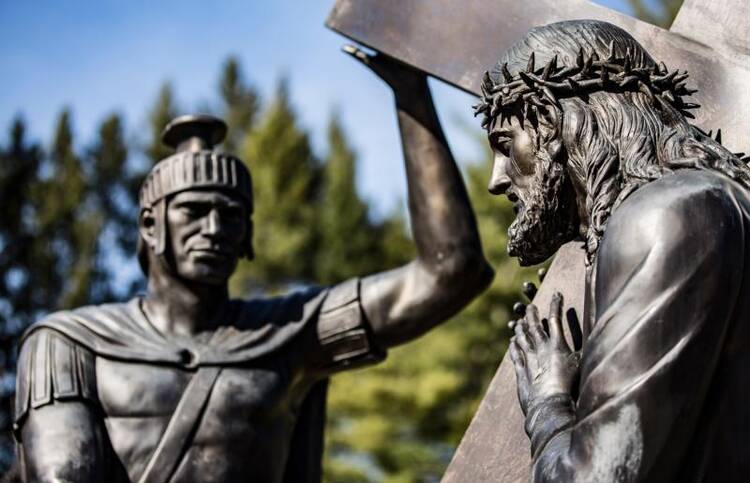VATICAN CITY (CNS) -- While Pope Francis' Way of the Cross service on Good Friday has been transferred to the Vatican because of the coronavirus pandemic, the meditations focus, as always, on those who share the pain, suffering and heartbreak that characterized Christ's passion and death.
In a letter published in an Italian newspaper in early March, Pope Francis said he chose the Catholic community of the Due Palazzi prison in Padua so that the meditations would reflect on the lives of those involved in the prison system to illustrate how "the resurrection of a person is never the work of an individual, but of a community walking together."
The result is a set of meditations on the traditional 14 stations written not only by prisoners, but also by people directly affected by crime, including prisoners' families, victims and even a priest falsely accused of a crime.
Prison guards, probation officers and volunteers also authored some of the meditations, which were released in Italian April 3 by Libreria Editrice Vaticana, the Vatican publishing house.
The first station, "Jesus is condemned to death," was written by a prisoner who, along with his father, was condemned to serve a life sentence.
"So many times, in the courts and in the newspapers, that cry resounds: 'Crucify him, crucify him!' It's a cry I've also heard about myself," he wrote. However, after recounting the events in his life that led him to a life of crime, the prisoner said he felt more "like Barabbas, Peter and Judas in one person."
"When, locked in a cell, I reread the pages of the Passion of Christ and I burst into tears," he wrote. "After 29 years in prison, I have not yet lost the ability to cry, to feel ashamed of my past, of the evil I have done."
The reflections on Christ's death also detail the tragic consequences of those affected directly by crimes. The meditation for the second station, for example, was written by a couple whose daughter was murdered.
"In that horrible summer, our life as parents died along with that of our two daughters," the parents wrote. "One was killed with her best friend by the blind violence of a man without mercy. The other, who miraculously survived, was deprived of her smile forever."
Neither justice nor time, they wrote, eased their suffering as "victims of the worst pain that exists: surviving the death of a daughter."
Yet in moments of despair, "the Lord comes to meet us" and allows them to not only care for each other as a couple, but also to care for the most vulnerable.
"He invites us to keep the door of our home open to the weakest, to the desperate, to welcome those who knock on our door, even just for a bowl of soup. Making charity our commandment is a form of salvation for us; we do not want to give in to evil," the parents wrote.
A priest who was falsely accused of abuse by a former student was chosen to write the meditation for the 11th station, "Jesus is nailed to the cross."
The accusations made against him, he said, "were made of words as hard as nails" and seeing his name written on a sign outside the courtroom "was the darkest moment" for him.
"In that moment, I realized I was a man forced to prove his innocence, without being guilty. I was hanging on the cross for 10 years. It was my Way of the Cross populated with folders, suspicions, accusations and insults. Every time, in the courts, I looked for the crucifix on the wall. I stared at it while the law investigated my story," he wrote.
During the 10-year criminal investigation against him, the priest said he "never thought of shortening the cross" and found that throughout his ordeal, he was helped along the way by the support of his students and their families who "bore the weight of the cross with me and wiped away many tears."
"Together with me, many of them prayed for the boy who accused me," the priest wrote. "We will never stop doing it. The day I was fully acquitted, I discovered that I was happier than I was 10 years ago. I experienced God's action in my life. Hanging on the cross, my priesthood was illuminated."
The Way of the Cross meditations were not just confined to prisoners and victims, but also the families of those imprisoned who share in the grief and loss of a loved one.
The meditation for the eighth station, "Jesus meets the women of Jerusalem," was written by the daughter of a prisoner serving a life sentence who said that she not only suffered due to her father's absence but also because she was often asked to answer for his crimes.
"'Are you fond of your father? Do you ever think of the pain your father caused to his victims?'" she recalled being asked by people.
While telling them it's "almost impossible" to not think of her father's victims, she said she also asks, "'Have you ever thought that of all the victims of my father's actions, I was the first?' For 28 years, I've been condemned to grow up without a father."
The meditations close with a contribution from a prison guard who is also a permanent deacon, who said does everything he can "to defend the hope of people who are resigned, frightened by the thought that one day they will be released and risk being rejected by society again."
"In prison I remind them that, with God, no sin will ever have the last word."










